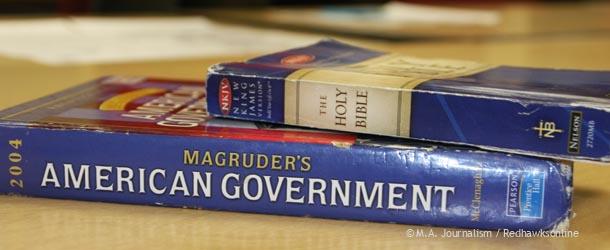In his farewell address President George Washington urged against the establishment of political parties.
“There is an opinion that parties in free countries are useful checks upon the administration of the government and serve to keep alive the spirit of liberty. This within certain limits is probably true; and in governments of a monarchical cast, patriotism may look with indulgence, if not with favor, upon the spirit of party. But in those of the popular character, in governments purely elective, it is a spirit not to be encouraged.”
But it happened anyway and is now a facet of American culture.
As the parties have evolved, the opinions about the parties also evolved and became diverse and individual within the nation as well as in Minnehaha Academy, a Christian school. With the election fast approaching on Nov. 6 the question “How do Christians vote?” seemed like a good on.
Pulling a brown Bible from his desk, sacred studies teacher David Elliott turned to Timothy 2. Elliott read, “Pray for all kings, and man, and authority over you so that you may live a peaceful and tranquil life.” Interpreting this passage, Elliott concluded that government came from God, and it was “meant to keep man’s sinful nature in check.”
For senior Madison Ryan, politics and Christian faith don’t necessarily walk hand in hand for a couple reasons, the first of which, being, politics are so public and hyped.
“I’m not very political just because the political atmosphere kind of drives me crazy,” said Ryan, who nonetheless identifies herself as a Democrat. “I really don’t like politicians and the way that it’s become more of a publicity thing. I think I know about the issues, but I don’t really follow politicians especially since I’m not able to vote at this point.”
With so many different people that claim Christianity as their religion there are still different interpretations.
“I tend to separate them,” said Ryan. On abortion, for example, she said, “Personally I’m pro-life, but politically I’m pro-choice.”
Ryan went on to describe her views on the marriage amendment.
“I believe our country was founded on equality,” said Ryan. She believes there were periods of time where our country showed more equality.
“I think this is the next step towards kind of sticking with the philosophy of our nation. What’s clouding it for a lot of people is their religious or personal beliefs about if gay people should be together or not [in marriage], and for me I’m still figuring out what I believe personally about whether it’s a sin to be gay or not. But I know for me politically it should be a right. [In] this election, gay rights is such a huge issue and the fact that Obama has said explicitly that he supports equal gay rights [is] a big thing for me.”
Ryan is also interested in social welfare. She said she’s passionate about “social issues and human rights, I’m passionate about welfare, and there’s kind of a weird balance there because there is the ‘are these people mooching off the system?’ or ‘are these people really in need? And for me people in need has always been a big thing, I think that it is important to help people in need and there will always be people who are going to mooch off of that.”
Social studies teacher David Hoffner believes the government has taken over the social welfare.
“I think Christians need to have a vision of society that cares for the poor, the orphaned and the widow, that wants to feed and clothe people, that wants to protect children, that wants to do those things,” said Hoffner. “[But] we now live in an age where we assume that it’s the government’s role to take care of the poor, and I think that’s a failure of Christians to recognize [that] they as churches, as Christians, as a community of believers, need to care for the orphans and poor…What are we [as Christians] doing about that?”
Those are exactly the questions Ryan, asks and even though she cannot vote yet, she’s willing to take the time to learn more.
“When I’m able to vote, I will become a lot more educated about what each politician believes.”
For senior Nicole Nipper her Christianity leans her towards a conservative political view.
“I would say that I was a Christian before I was a Republican, and I would say that being a Christian doesn’t necessarily mean that you are a Republican or a Democrat,” said Nipper.
Regarding the marriage amendment and gay rights, Nipper believes in equal rights for all, but she expressed concern about the way the amendment is written.
“I read what was going to be on the ballot, and how it’s worded, and essentially it seems as if it’s asking for a faith statement,” said Nipper. “With that, I believe marriage is between one man and one woman [and] that doesn’t mean that I would deny rights to those who are homosexuals. I believe the definition of marriage is between one man and one woman, so on that issue I will vote yes.”
Social studies teacher Nathan Johnson has always struggled with political parties.
“I have to be undecided still because I’m still reflecting and considering what it means to be a Christian in a democracy, and I don’t have a settled answer to that,” said Johnson.
Regardless of what party or stance each person supports, sacred studies teacher Dan Bergstrom beleives it’s crucial for everyone to listen to one another and have civil conversations about faith and politics.
“I hope Minnehaha students value the diversity within the Christian community,” said Bergstrom. “I think there is great benefit in promoting and continuing a dialogue between people that do not believe like I do in terms of political philosophy, and people that do as well. I think [politics] should be able [to] be talked about with respect to one another, so that ideas and informed voting can take place.”

